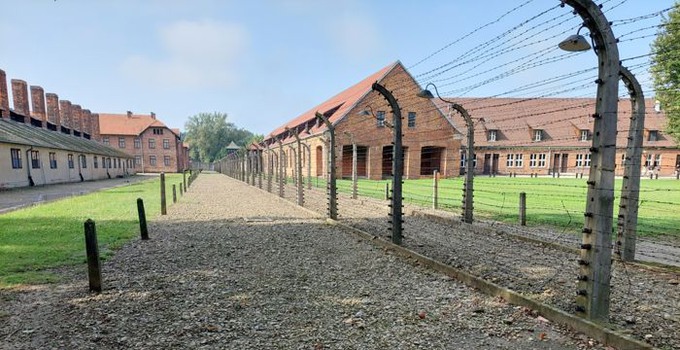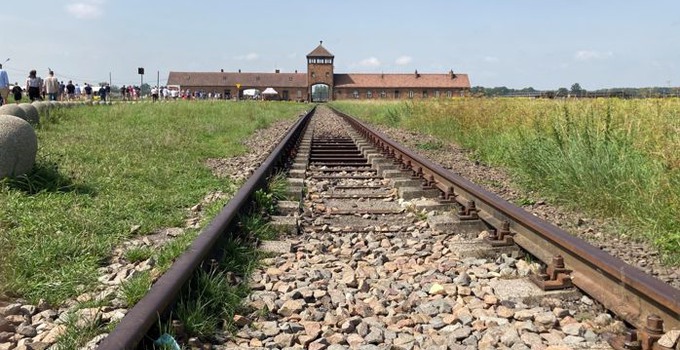
"I now recognize the ethical responsibility of the military profession"
When Axel Boltenberg and his classmates on the Joint Advanced Command and Staff Programme visited the Auschwitz concentration camp, it was with the aim of stimulating a reflection process centered on ethical dilemmas.
"The Holocaust is to be considered the ultimate failure from a professional-ethical perspective. Visiting the concentration camps is an experience that brings value beyond higher education credits, and I think these kinds of educational experiences would be valuable to all Swedish officers” says Patrik Schwartz, who teaches at the Senior Officer Programme at the Swedish Defence University.
Active reflection process
The course Personal Leadership Development for Military Commanders 2 is given during the second year at HOP, and begins with two days of theory before the trip down to Poland and the visit to the Auschwitz-Birkenau concentration camp. On site, Patrik Schwarz and the 75 officers on the Joint Advanced Command and Staff Programme took a guided tour of the camp. They also had a seminar where they discussed the experience itself, the feelings and thoughts that arose during and after the visit. How were the German officers in Auschwitz possibly able to carry out the execution orders?
"We want to reflect on the mechanisms that were in place during the holocaust, whatever it was that induced people to completely dehumanize Jews and other victims, and ultimately execute them," says Patrik Schwartz.
The part of the course focused on professional ethics highlights the ethical challenges that the officer profession entails, including the making crucial decisions that affect other people.
"We talk a lot about how important it is to maintain an active reflection process, to continue to be aware of the fact that people will be affected by my decisions, but also the reasons why a particular decision needs to be made.”

Image from concentration camp Auschwitz. Photo: Mathias Guss.
Moral sensibility and dehumanization
Moral sensibility is about adopting a certain attitude toward a certain action under certain conditions. The conditions, or the situation to be resolved, determine the degree of sensitivity. Patrik Schwartz explains that those who work in certain professions, such as health care, may have the goal of maximizing moral sensitivity in order to save their patient at all costs. On the other hand, an officer who is to lead an armed battle may have to be prepared to lower his moral sensibility in order to solve his task. This is a process that all officers must be aware of and continuously reflect on. Dehumanization is an example of a mechanism that enables us to stop treating each other as human beings. Viewing other people as resources or pieces in a game is an example of dehumanization.
"In the military profession, we talk about goals and difficult tasks to be solved. When we do this, we need to be aware of what we are doing and how we are doing it. The purpose of the course is, among other things, for the officers to become aware of what they are supposed to do. They should also be able to reflect on the range from being completely emotionally involved in a decision to making decisions based solely on the task at hand and what needs to be done in that situation," he explains.

Gate of Death. Railway up to the concentration camp Auschwitz. Photo: Mathias Wallin.
Second visit to Auschwitz
This was not Axel Boltenberg’s first time visiting Auschwitz. He first visited when he was in high school, as the school had a sister city in Poland. At that time, he focused squarely on the victims. Now, as a married man, parent, and officer at the submarine flotilla in Karlskrona, additional aspects of the event made an impression.
"For me, it became clear how I and my life have developed since I was there the first time. From an ethical and moral perspective, which this course focuses on, it was the dehumanization and the scope of the whole business that really struck me.”
Is dehumanization a prerequisite?
Axel Boltenberg has worked for ten years as an officer in the Swedish Armed Forces. He is used to giving orders and making decisions that affect other people. Can he understand how the German officers were able to act the way they did, or is it even possible to find explanations?
"The second time in Auschwitz, it felt absolutely grotesque when I realized how extensive the Holocaust was, and with what efficiency the atrocities were carried out. It was very hard to take in and I was struck by the scale of it all.”
"At the same time, I have worked to try to implement comprehensive plans and ideas and have seen how we build structures and bureaucracies in our society to deal with various problems. So in reality, I can, technically, understand the volume and size," he says.
He further discusses the literature studies that are included in the course, and which provide different perspectives on how society puts labels on people in order to avoid seeing the individual, patient, or opponent, depending on context. These labels contribute to the dehumanization of others, the people who are actually impacted by the decisions we are making.
"It may be absolutely necessary in some professions to get a distance between oneself and the decision, or to obtain a certain objectivity in regards to what you need to do in relation to someone. These reflections make me think that this dehumanization is more or less present in our society all the time.”
"In the role of an officer, you are set to solve certain tasks for the defence of Sweden, and this will mean that you need to carry out actions that are permitted in war, but in peace. It is necessary to reflect on this matter.”
The reflection process is absolutely central
If we assume that the Holocaust is not a singular event in history, but that history instead repeats itself, what can you do as an officer to ensure that actions with an important purpose do not turn into crimes?
"I think dehumanisation is a natural part of the job as a professional soldier because we need to fight an adversary. At the same time, it must not go so far as to commit crimes or abuse our position. For a commander in the Armed Forces, this type of input is necessary in order to maintain an active reflection process, so that you constantly remind yourself that it is people I am influencing with my decision, he explains.”
Information about professional ethical dilemma
A main task in the course is for the officers to formulate a future ethical dilemma that could arise in their next position. It can be anything from the risk of committing war crimes in an armed conflict, to ethical dilemmas in the daily staff work.
Have you, during the course, reflected on anything that has happened earlier in your professional life where you feel that you would have acted differently if you had had the knowledge and tools that this course has given you?
"Taking this course, going to Auschwitz, and the fact that Russia invaded Ukraine on February 24 this year have all put things in a slightly different light for me," says Axel Boltenberg and explains:
"The dilemma of how I look at the opponent has been with me all along, but it has definitely been concretized over the past year, perhaps partly in a different way. I haven't really identified any previous experience where I would have reasoned differently based on my new knowledge, but I definitely think that my age and life experience play a big role in how I look at my job today.”
Mentoring and coaching
The course also includes an element of coaching, meaning that you are to be coached by your mentor as well as by another student who is on the same organizational level. How do you feel about this?
"The relationship you create with your classmates is by far the greatest benefit of the entire programme. Coaching is very good for nurturing trust, as we are forced to discuss things that we might not have done if we had just talked over a coffee. Coaching is absolutely central in a course like this where you really need to expose your fears and expectations.
Now that you have a semester and a half left, is there anything concrete that you will take with you from the course when you return to work?
"The concrete thing is that I have understood the seriousness of my profession to an even greater extent. The decisions we officers make when we do our job can have major consequences. I'm not afraid to make those decisions, but I've gained a deeper understanding of the seriousness of it and the consequences for me personally, my staff, the opponent, and for Sweden. It may sound a bit pompous, but it's really the concrete thing I take with me.
Monika Wallström
Three blocks in the course Personal Leadership Development for Military Chiefs (PLUMC 2)
Part two of the course in personal leadership development for military commanders, which is part of the Joint Advanced Command and Staff Programme, consists of three parts.
- The first block is about professional ethics, where students reflect on potential future challenges or problems in the field of professional ethics. It also entails reflecting on different possibilities and courses of action to take in response to the challenge.
- The second block is about culture and organization and to formulate potential challenges or problems in order to then proceed with opportunities and courses of action with the support of the scientific literature linked to the course.
- The third block is about looking at your own and your classmates' development during the Joint Advanced Command and Staff Programme, and reflecting on this process.
More about
Page information
- Published:
- 2024-05-13
- Last updated:
- 2025-01-07
